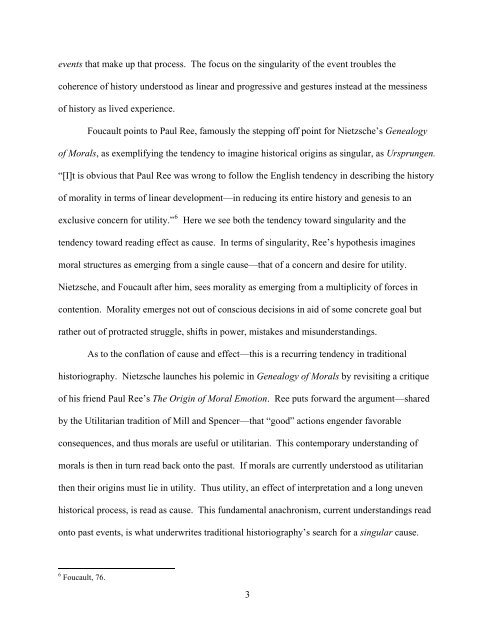A Genealogy of the Extraterrestrial in American Culture
A Genealogy of the Extraterrestrial in American Culture
A Genealogy of the Extraterrestrial in American Culture
Create successful ePaper yourself
Turn your PDF publications into a flip-book with our unique Google optimized e-Paper software.
events that make up that process. The focus on <strong>the</strong> s<strong>in</strong>gularity <strong>of</strong> <strong>the</strong> event troubles <strong>the</strong><br />
coherence <strong>of</strong> history understood as l<strong>in</strong>ear and progressive and gestures <strong>in</strong>stead at <strong>the</strong> mess<strong>in</strong>ess<br />
<strong>of</strong> history as lived experience.<br />
Foucault po<strong>in</strong>ts to Paul Ree, famously <strong>the</strong> stepp<strong>in</strong>g <strong>of</strong>f po<strong>in</strong>t for Nietzsche’s <strong>Genealogy</strong><br />
<strong>of</strong> Morals, as exemplify<strong>in</strong>g <strong>the</strong> tendency to imag<strong>in</strong>e historical orig<strong>in</strong>s as s<strong>in</strong>gular, as Ursprungen.<br />
“[I]t is obvious that Paul Ree was wrong to follow <strong>the</strong> English tendency <strong>in</strong> describ<strong>in</strong>g <strong>the</strong> history<br />
<strong>of</strong> morality <strong>in</strong> terms <strong>of</strong> l<strong>in</strong>ear development—<strong>in</strong> reduc<strong>in</strong>g its entire history and genesis to an<br />
exclusive concern for utility.” 6<br />
Here we see both <strong>the</strong> tendency toward s<strong>in</strong>gularity and <strong>the</strong><br />
tendency toward read<strong>in</strong>g effect as cause. In terms <strong>of</strong> s<strong>in</strong>gularity, Ree’s hypo<strong>the</strong>sis imag<strong>in</strong>es<br />
moral structures as emerg<strong>in</strong>g from a s<strong>in</strong>gle cause—that <strong>of</strong> a concern and desire for utility.<br />
Nietzsche, and Foucault after him, sees morality as emerg<strong>in</strong>g from a multiplicity <strong>of</strong> forces <strong>in</strong><br />
contention. Morality emerges not out <strong>of</strong> conscious decisions <strong>in</strong> aid <strong>of</strong> some concrete goal but<br />
ra<strong>the</strong>r out <strong>of</strong> protracted struggle, shifts <strong>in</strong> power, mistakes and misunderstand<strong>in</strong>gs.<br />
As to <strong>the</strong> conflation <strong>of</strong> cause and effect—this is a recurr<strong>in</strong>g tendency <strong>in</strong> traditional<br />
historiography. Nietzsche launches his polemic <strong>in</strong> <strong>Genealogy</strong> <strong>of</strong> Morals by revisit<strong>in</strong>g a critique<br />
<strong>of</strong> his friend Paul Ree’s The Orig<strong>in</strong> <strong>of</strong> Moral Emotion. Ree puts forward <strong>the</strong> argument—shared<br />
by <strong>the</strong> Utilitarian tradition <strong>of</strong> Mill and Spencer—that “good” actions engender favorable<br />
consequences, and thus morals are useful or utilitarian. This contemporary understand<strong>in</strong>g <strong>of</strong><br />
morals is <strong>the</strong>n <strong>in</strong> turn read back onto <strong>the</strong> past. If morals are currently understood as utilitarian<br />
<strong>the</strong>n <strong>the</strong>ir orig<strong>in</strong>s must lie <strong>in</strong> utility. Thus utility, an effect <strong>of</strong> <strong>in</strong>terpretation and a long uneven<br />
historical process, is read as cause. This fundamental anachronism, current understand<strong>in</strong>gs read<br />
onto past events, is what underwrites traditional historiography’s search for a s<strong>in</strong>gular cause.<br />
6 Foucault, 76.<br />
3















